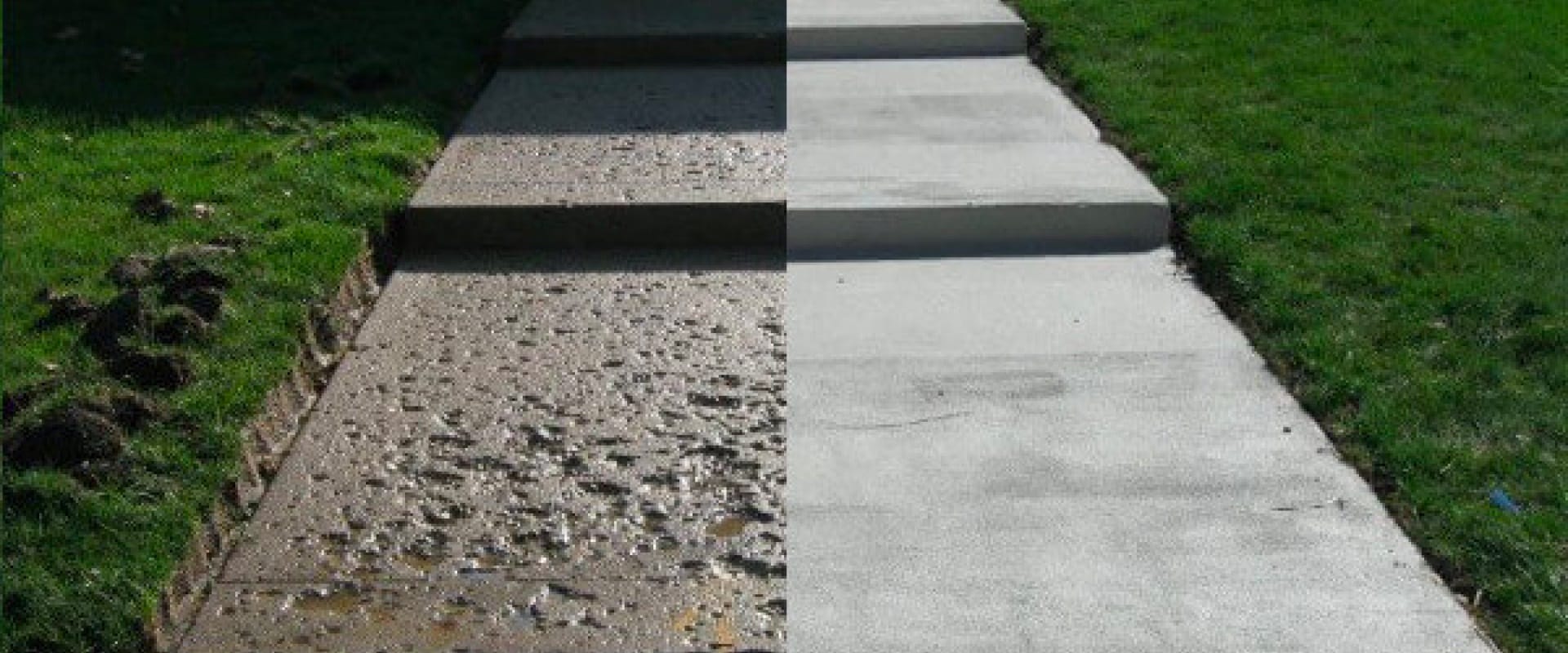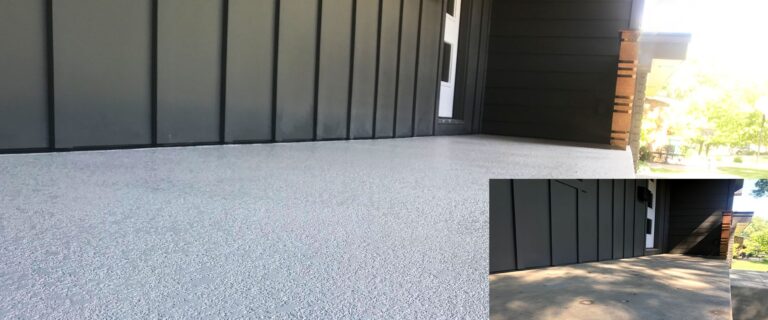The Pros and Cons of Concrete Resurfacing (and Why You Should Consider It)
Are you tired of looking at your old, worn-out concrete surfaces?
The process of resurfacing concrete can help breathe new life into your existing concrete. It involves applying a new layer over existing concrete to restore its appearance and functionality.
But, like any home or commercial upgrade, you’ll need to weigh up the advantages and possible challenges.
An increasingly popular flooring upgrade due to its cost-effectiveness and aesthetic appeal, we’ll help you determine whether resurfacing is the right step by covering:
- An overview of the resurfacing process
- An in-depth analysis of the potential pros and cons of concrete resurfacing
- A comparison with DIY options or alternative services
By the end of this article, you’ll have a comprehensive understanding of whether this project is the right choice for your needs.
Let’s get right into it.
What is Concrete Restoration?
It is a transformative process designed to rejuvenate existing concrete surfaces.
Instead of going through the hassle and expense of tearing out old concrete and pouring a new slab, resurfacing allows you to apply a fresh, durable layer over the top.
This new surface can restore the concrete’s original look or even introduce a new design and finish.
In areas where the climate can be tough on outdoor surfaces, it offers a practical solution to deal with cracks, stains, and wear.
The process typically begins with thorough cleaning and repairing of the existing concrete. Once prepared, a bonding agent is applied, followed by a new concrete overlay.
This overlay can be customised with various colours, textures, and patterns, making it a versatile option for both functional and decorative purposes.
From driveways and patios to pool decks and garage floors, it offers a way to refresh and protect various surfaces and is an appealing choice for many homeowners and businesses looking to enhance their property’s appearance without breaking the bank.
Concrete Refinishing Benefits
✔ Cost-Effective Solution
One of the most significant advantages is its cost-effectiveness.
Instead of completely removing and replacing old concrete, resurfacing allows you to apply a new layer over the existing surface. This method can save homeowners up to 50-70% compared to the cost of a full replacement.
The savings are substantial, making it an attractive option for budget-conscious property owners.
How Much Does Epoxy Garage Flooring Cost?
✔ Quick and Efficient Process
It is not only affordable but also remarkably quick. Traditional concrete replacement can take several days or even weeks, including the time needed for demolition, removal, and new concrete curing.
In contrast, resurfacing can often be completed in just a couple of days, depending on the size of the area. This efficiency means less disruption to your daily routine and a faster return to enjoying your revitalised space.
✔ Versatility in Design
Resurfacing isn’t just about restoring old concrete; it’s an opportunity to reinvent your space. The range of design options available with resurfacing is impressive.
You can choose from various colours, textures, and patterns to match your aesthetic preferences.
Whether you want a sleek, modern look or a rustic, textured finish, resurfacing can deliver. The ability to customise the look of your concrete is a major draw for many homeowners.
✔ Enhanced Durability
A well-executed resurfacing project can significantly enhance the durability of your surfaces. The new layer applied is designed to withstand heavy traffic, harsh weather conditions, and other environmental factors.
This added protection means your resurfaced concrete can last for many years, reducing the need for frequent repairs and maintenance.
High-quality resurfacing products can also include features like UV resistance, which helps maintain the colour and integrity of the surface over time.
✔ Environmentally Friendly
By choosing to resurface rather than replace your concrete, you’re making an environmentally friendly decision. Resurfacing reduces the need for new materials and minimises waste, as the existing concrete is reused rather than discarded.
This approach aligns with sustainable building practices, which are increasingly important in today’s eco-conscious world.
Additionally, many resurfacing products are designed to be low in volatile organic compounds (VOCs), contributing to better air quality and a healthier environment.
✔ Increased Property Value
This nvestement can also boost the value of your property. A well-maintained and visually appealing exterior can enhance curb appeal, making your home more attractive to potential buyers.
According to some real estate experts, properties with high-quality, well-maintained concrete surfaces can see an increase in market value, offering a solid return on investment.
For businesses, a polished and professional appearance can attract more customers and clients, further increasing the value of the resurfacing project.
Potential Drawbacks of Concrete Overlay
✘ Limited Lifespan Compared to New Concrete
While it can extend the life of your existing surfaces, it generally doesn’t last as long as brand-new concrete.
The lifespan of a resurfaced area is typically around 10-15 years, whereas new concrete can last 25-30 years or more if properly maintained.
This means that, although resurfacing is cheaper initially, it might require additional touch-ups or reapplications over time, which can add to the long-term cost.
✘ Not Suitable for Severely Damaged Concrete
It works best on surfaces with minor to moderate wear and tear. If your concrete is severely damaged—such as having deep cracks, significant spalling, or major structural issues—resurfacing might not be a viable option.
In such cases, the underlying damage can compromise the new surface, leading to a shorter lifespan and potentially requiring full replacement down the line.
Homeowners need to carefully assess the condition of their existing concrete before opting for resurfacing.
✘ Potential for Adhesion Issues
The success of a resurfacing project relies heavily on the proper adhesion of the new layer to the old surface.
If the existing concrete is not adequately prepared, or if the bonding agent is not applied correctly, the new surface may not adhere properly.
This can result in peeling, cracking, or flaking, which undermines the durability and appearance of the resurfaced area. Achieving optimal adhesion requires skilled application and thorough preparation, which can be challenging for DIY enthusiasts.
✘ Susceptible to Weather Conditions
Weather conditions can impact the effectiveness and longevity of the concrete. Extreme temperatures, heavy rain, and humidity can affect the curing process and the final outcome.
For instance, resurfacing during very hot or cold weather can lead to improper setting, while moisture can interfere with adhesion.
Homeowners need to time their resurfacing projects carefully and possibly invest in protective measures to ensure the best results.
✘ Maintenance Requirements
Although it can reduce the need for major repairs, it does require regular maintenance to keep it looking its best. This includes periodic cleaning, sealing, and addressing any minor damage that might occur over time.
Neglecting maintenance can lead to the surface deteriorating faster than expected, which can diminish the benefits of resurfacing and lead to additional costs.
✘ Risk of Mismatched Aesthetics
When resurfacing only a portion of a large concrete area, there’s a risk that the new surface may not perfectly match the existing sections.
Differences in colour, texture, and finish can be noticeable, especially if the rest of the concrete has aged significantly.
This can create a patchy or uneven appearance, which might be undesirable for some homeowners. Achieving a seamless look often requires resurfacing larger areas or the entire surface, which can increase costs.
| Pros | Cons |
| Cost-Effective Solution | Limited Lifespan Compared to New Concrete |
| Quick and Efficient Process | Not Suitable for Severely Damaged Concrete |
| Versatility in Design | Potential for Adhesion Issues |
| Enhanced Durability | Susceptible to Weather Conditions |
| Environmentally Friendly | Maintenance Requirements |
| Increased Property Value | Risk of Mismatched Aesthetics |
Concrete Resurfacing vs. Alternatives: Making the Right Choice
Professional Resurfacing vs. DIY Options
Ease of Application
When it comes to ease of application, professional resurfacing has a clear edge over DIY options. DIY resurfacing kits are available, but they require a fair amount of skill and experience to achieve professional-looking results.
Mistakes during the preparation or application stages can lead to poor adhesion, uneven surfaces, and reduced durability.
Hiring professionals ensures that the job is done right the first time, with high-quality materials and expert techniques.
Cost Considerations
DIY resurfacing is undeniably cheaper upfront, as you save on labour costs.
However, the potential for errors with DIY projects can lead to additional expenses down the line, such as having to redo the work or repair damage caused by improper application.
Resurfacing vs. Concrete Replacement
Durability and Longevity
Concrete replacement offers unmatched durability and longevity, with new concrete lasting up to 30 years or more. Resurfacing, while durable, generally lasts around 10-15 years.
If you’re looking for a long-term solution and are willing to invest more upfront, concrete replacement is the way to go.
Environmental Impact
Resurfacing is more environmentally friendly compared to full replacement. By reusing the existing concrete slab, resurfacing reduces waste and the demand for new materials.
Concrete replacement involves demolishing the old slab and transporting it to a landfill, followed by pouring new concrete, which has a higher carbon footprint.
Resurfacing vs. Alternative Coatings
Aesthetic Flexibility
Alternative coatings like epoxy or polyurethane offer different aesthetic possibilities. Epoxy coatings can provide a sleek, high-gloss finish that’s perfect for garages and industrial spaces.
Polyurethane coatings are highly durable and resistant to chemicals. Concrete resurfacing offers more flexibility in terms of textures and patterns, making it ideal for a broader range of applications, including patios, driveways, and pool decks.
Application and Maintenance
Epoxy and polyurethane coatings can be more complex to apply and require a meticulously clean and dry surface to bond properly. Concrete resurfacing, while still needing a prepared surface, tends to be more forgiving and versatile.
Maintenance for epoxy and polyurethane can be more intensive, as these surfaces can be prone to chipping and require regular reapplication of sealants.
| Comparison Criteria | Concrete Resurfacing | DIY Resurfacing | Concrete Replacement | Epoxy/Polyurethane Coatings |
| Ease of Application | Professional expertise ensures quality | Requires skill and experience | Professionally handled | Requires meticulous preparation |
| Cost Considerations | Mid-range cost, long-term value | Lowest initial cost, potential rework costs | Highest upfront cost, long-term investment | Mid to high cost, frequent maintenance |
| Durability and Longevity | 10-15 years | Varies based on skill | 25-30 years or more | 5-10 years, frequent maintenance |
| Environmental Impact | Eco-friendly, minimal waste | Similar to professional resurfacing | High waste, high carbon footprint | Variable, depending on materials |
| Aesthetic Flexibility | High, various textures and patterns | Limited to kit capabilities | Customisable but costly | High gloss, limited textures |
| Maintenance | Moderate, regular cleaning and sealing | Varies, often more intensive | Low, occasional repairs | Intensive, prone to chipping |
Save Time and Money on Your Next Concrete Project with PM Industries
At PM Industries, we pride ourselves on being the industry leader in Perth, backed by a legacy of excellence and a commitment to avoiding costly errors.
Our team of experts brings unparalleled experience and a keen eye for detail to every project, ensuring your concrete surfaces look and perform their best for years to come.
Ready to transform your concrete surfaces? Contact PM Industries today on 0436 837 699 or claim your fast and FREE quote online.


